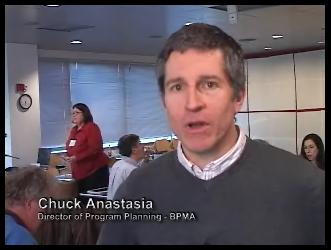I heard a great story on All Things Considered tonight during my drive home. Today, the Washington Post's Gene Weingarten won a Pulitzer prize for feature writing for his story about what happened when he recruited Joshua Bell, one of the most accomplished classical musicians
 in the world, to appear incognito in a Washington DC metro station, playing some of the world's best music on a Stradivarius violin with an estimated value in excess of 3.5 million dollars. This performance was arranged as an experiment -- In an ordinary setting at an inconvenient time, would beauty overcome routine? The anonymous virtuoso performed for 43 minutes as over 1000 commuters passed by, with only a handful pausing for more than a moment. Bell promised not to “cheap out” on the performance: He put feeling into the performance, playing with enthusiasm, he leaned into the music and arched on tiptoes as the music soared. Here’s an excerpt from the article describing what happened. You can hear a recording of the performance and view video clips at the Washington Post website.
in the world, to appear incognito in a Washington DC metro station, playing some of the world's best music on a Stradivarius violin with an estimated value in excess of 3.5 million dollars. This performance was arranged as an experiment -- In an ordinary setting at an inconvenient time, would beauty overcome routine? The anonymous virtuoso performed for 43 minutes as over 1000 commuters passed by, with only a handful pausing for more than a moment. Bell promised not to “cheap out” on the performance: He put feeling into the performance, playing with enthusiasm, he leaned into the music and arched on tiptoes as the music soared. Here’s an excerpt from the article describing what happened. You can hear a recording of the performance and view video clips at the Washington Post website.Three minutes went by before something happened. Sixty-three people had already passed when, finally, there was a breakthrough of sorts. A middle-age man altered his gait for a split second, turning his head to notice that there seemed to be some guy playing music. Yes, the man kept walking, but it was something.
A half-minute later, Bell got his first donation. A woman threw in a buck and scooted off. It was not until six minutes into the performance that someone actually stood against a wall, and listened.
Things never got much better. In the three-quarters of an hour that Joshua Bell played, seven people stopped what they were doing to hang around and take in the performance, at least for a minute. Twenty-seven gave money, most of them on the run -- for a total of $32 and change. That leaves the 1,070 people who hurried by, oblivious, many only three feet away, few even turning to look.
When interviewed after the performance, Bell said hadn't known what to expect, but for some reason, he was nervous.
"It wasn't exactly stage fright, but there were butterflies," he says. "I was stressing a little."Toward the end of the feature, Weingarten philosophizes about what happened;
"When you play for ticket-holders," Bell explains, "you are already validated. I have no sense that I need to be accepted. I'm already accepted. Here, there was this thought: What if they don't like me? What if they resent my presence . . ."
My mind jumped immediately from the radio story to an article I had read yesterday in the Sunday Parade Magazine about the Last Lecture by Randy Pausch.In his 2003 book, Timeless Beauty: In the Arts and Everyday Life, British author John Lane writes about the loss of the appreciation for beauty in the modern world. The experiment at L'Enfant Plaza may be symptomatic of that, he said -- not because people didn't have the capacity to understand beauty, but because it was irrelevant to them.
"This is about having the wrong priorities," Lane said.
If we can't take the time out of our lives to stay a moment and listen to one of the best musicians on Earth play some of the best music ever written; if the surge of modern life so overpowers us that we are deaf and blind to something like that -- then what else are we missing?
In September of 2007, Randy Pausch, a 46-year-old computer-science professor at Carnegie Mellon University, who has terminal Pancreatic cancer and expected to live for just a few more months said goodbye to his students and the Pittsburgh college with one last lecture called "How to Live Your Childhood Dreams," on his life's journey and the lessons he's learned. The Wall Street Journal called it "the lecture of a lifetime" and those who have seen it more than agreed. The video is long, but very worthwhile. I sent this link with the complete lecture video to each of my kids and my siblings. I'm offering prayers for Randy and his family as they face this very difficult challenge. Please remember them in your prayers as well.
In yesterday's Parade article, Randy Pausch recalls his childhood experience of the first lunar landing.
I was 8 in the summer of 1969, when men first walked on the moon. I was at camp, and we campers were brought to the main house to watch the moment on TV. But the astronauts were taking a while, and it was late. The counselors sent us to our tents to sleep, and we missed the first walk.I was peeved. I thought: “My species has gotten off our planet and is in a new world for the first time, and you people think bedtime matters?”
I'm making an effort to hear the music, smell the roses, and experience the people who come into my life every day.
Peace,


